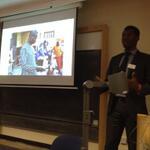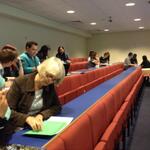Interesting Information literacy PHd presentations at iDocQ 2014 colloquium
 Tuesday, July 1, 2014 at 9:53AM
Tuesday, July 1, 2014 at 9:53AM I attended iDocQ 2014 on Friday at Glasgow University. iDocQ is the annual doctoral colloquium aimed at students studying for PhDs in information science and other related disciplines at Scottish universities that are members of the Scottish Graduate School of Social Science. I was there as I'm about to start a PHd by Published works at Edinburgh Napier University. My PHd will be in relation to my information literacy and lifelong learning research work.
It was a really interesting day it started with a fascinating keynote presentation on research impact delivered by Professor John Robertson on bias in reporting of the independence debate in the media 'Research Impact on Media and Academic Elites.
After a coffee break there was student presentation on their work as a 20×20 format (PechaKucha 20x20 is a simple presentation format where you show 20 images, each for 20 seconds. The images advance automatically and you talk along to the images). It was great to see a range of intersting topics. There were a couple of PHd topics of particulary interested to me and this CoP:
 Chikezie Emele RGU PHd Student 20x20 Photo by Hazel HallImprove the information literacy of men in Nigeria with prostrate cancer - Chikezie Emele, Robert Gordon University PHd student PHd Thesis Title Accessibility and Usability Of Prostate Cancer Information in SouthEast, Nigeria.
Chikezie Emele RGU PHd Student 20x20 Photo by Hazel HallImprove the information literacy of men in Nigeria with prostrate cancer - Chikezie Emele, Robert Gordon University PHd student PHd Thesis Title Accessibility and Usability Of Prostate Cancer Information in SouthEast, Nigeria.
Chikezie is at the early stages of his research but he spoke about the need to make the information culturally sensitive. For dissemination purposes he is looking at using the services of the local town crier as this is one of the sources of information that the locals use.
The radio is an other source used. other forms of dissemination being looked at are 'one to one sessions' and printed material. Mobile phone usage has spread widely so he will also look at using that. He wants to change the men from passive to proactive information seekers.
To investigate the everyday life information seeking of visually impaired young people - Katy Loudon, University of Strathclyde
Katy spoke about external and internal barriers and that in relation to visually impaired most barriers are seen as technology barriers but their are wider barriers. Katy was previously a primary school teacher and is bringing her teaching experience to her PHd. Her MSc dissertaion was An investigation into the information practices of first-time mothers of infants from birth to 12 months For me these add to the studies which link information literacy to lifelong learning.
After lunch Hazel Hall presented Using social media for impact looking at the range of social media tools to help us increase research impact .
 Photo by Hazel HallWe did an activity in pairs identify who used what socila media services and whether they were useful for: academic impact, personal impact and research into practice impact.
Photo by Hazel HallWe did an activity in pairs identify who used what socila media services and whether they were useful for: academic impact, personal impact and research into practice impact.
I currently use a few including Blogging, Twitter, Slideshare and LinkedIn, there are however a few that I need to check out includingAcademia.edu and Mendeley.
The last part of the day was a “research clinic” panel, where questions submitted anonymously by students were answered by the expert panel members on the basis of their own PhD experience, research activities, and experience attained in supervising doctoral candidates. On the panel was Hazel Hall, Edinburgh Napier; Ian Anderson, Glasgow; David McMenemy, Strathclyde; and Elizabeth Tait, Robert Gordon. I had submitted a question regarding the advice they would give a student starting their PHd Published by Works. I got some useful advice and also picked up some tips from the other student questions.
For more insight into the day see the tweets from the day at #idocq2014
Thanks to the four students who organised the day Frances Ryan of Edinburgh Napier University;Calum Liddle of Strathclyde University, Chikezie Emele of Robert Gordon University; and Wachi Klungthanaboon of Glasgow University.

Reader Comments